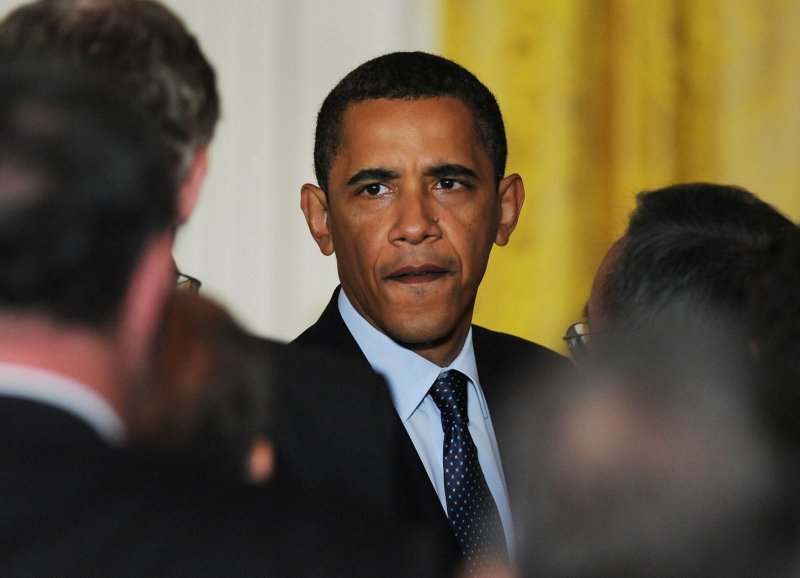U.S. President Barack Obama greets guests after delivering remarks on securing the cyber infrastructure of the U.S. in the East Room of the White House on May 29, 2009. (UPI Photo/Roger L. Wollenberg) |
License Photo
WASHINGTON, Sept. 16 (UPI) -- The greatest security threat looming for industrialized societies may not be a terrorist armed with a bomb but an enemy with a keyboard and Internet connection.
Government, military and security experts have warned for months, if not years, that cyberspace is a battleground of the 21st century, which government -- as well as private industry -- needs to address to avoid catastrophes of immense socio-economic disruption.
"This is not science fiction," Washington's Bipartisan Policy Center wrote in a recent assessment of progress made on recommendations of the enacting national security recommendations of a commission established after the 9/11 attacks of 2001. "It is possible to take down cyber systems and trigger cascading disruptions and damage.
"Defending the U.S. against such attacks must be an urgent priority."
The same holds true for other countries.
Chatham House, a British think tank, warned in a report that British industry, including those managing public utilities such as water and power, were failing to take strong measures to protect critical systems.
"Many only pay attention to it after something unpleasant has happened to them or a competitor and they realize they have to pay attention, perhaps throw some money at the problem," said David Clemente, a cybersecurity expert at the organization.
U.S. Army Gen. Keith Alexander, head of the new U.S. Cyber Command and director of the U.S. National Security Agency, said complacency or lip-service measures are no longer an option.
A disruptive attack is coming, he warned at a recent cybersecurity symposium.
"It is a question of time. What we don't know is how far out it is," Alexander said.
Hackers -- individual, government-sanctioned or corporate -- have intruded on computer systems for years. Reports estimate that hacking for individual gain or to obtain corporate information represents a $1 trillion loss annually to the world economy.
Computer hacking was used against Estonia and Georgia to cause infrastructure disruption during disputes with Russia, although Moscow has denied involvement.
Iran's controversial nuclear program has been targeted and disrupted by an unknown source using a computer virus.
Major U.S. government and defense contractors have been hacked as well as banking Web sites and social media sites.
U.S. Department of Defense agency sites have been the target of hackers for years.
The set up of U.S. Cyber Command now merges both defensive as well as offensive efforts.
Alexander and other experts are calling for increased information sharing and collaboration between government and industry.
The Defense Department has started a program called Defense Industrial Base Cyber Pilot for sharing classified information on threats with participating defense contractors and internet service providers. Reports indicate hundreds of attempted intrusions into systems were detected during a trial run.
Contributing to the danger of cyberattack is the outsourcing of the design of computer technologies abroad, which could lead to adversaries gaining entry to computer systems via the supply chain.
"The present situation is as dangerous as if the United States decided to outsource the design of bridges, electrical grids and other physical infrastructure to the Soviet Union during the Cold War," the Intelligence and National Security Alliance said.
The impact of computer/Internet disruptions is clear to anyone buffeted anywhere in the world by Mother Nature. Disruptions to power grids crashes computer systems that control everything from air traffic control, to nuclear power plants to home power supplies.
In 2003, the U.S. Northeast lost power when a falling tree branch hit a power pole and caused a utility company's computer to go into "pause" mode, cutting power supply to a number of states.
A successful attack from cyberspace could do the same.





